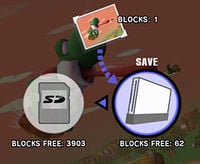Snapshot: Difference between revisions
No edit summary |
|||
| Line 21: | Line 21: | ||
*[http://smashboards.com/showthread.php?t=142971 ''SSBB'' Snapshot files. We need to crack em!] - The Smashboards topic where snapshot decoding was tested and performed. | *[http://smashboards.com/showthread.php?t=142971 ''SSBB'' Snapshot files. We need to crack em!] - The Smashboards topic where snapshot decoding was tested and performed. | ||
*[http://www.mediafire.com/download/cy4iabxtfc52c24/bin2jpg.rar bin2jpg] - A compressed folder that contains the files needed to decrypt ''Brawl's'' snapshot files on a computer. | *[http://www.mediafire.com/download/cy4iabxtfc52c24/bin2jpg.rar bin2jpg] - A compressed folder that contains the files needed to decrypt ''Brawl's'' snapshot files on a computer. | ||
*[https://benstoolset.com/image-converter Image converter] - Free online jpg converter. | |||
{{SSBMMenus}} | {{SSBMMenus}} | ||
Revision as of 12:17, January 23, 2018
Snapshots (写真, Photos) are image files used to save certain moments of gameplay. They were introduced in Super Smash Bros. Melee and the feature was expanded upon in future installments of the series.
In Super Smash Bros. Melee
In Melee, taking a snapshot requires use of Camera Mode, using the controller in port 4 to control the camera and capture pictures. Captured snapshots are then saved to the GameCube's memory card, which can then be viewed in the appropriate Data menu option. No efficient method exists for exporting snapshots in Melee to be saved onto a personal computer, leaving the feature rather limited.
Snapshots are saved to the Memory Card in Slot A. However, Melee allows players to also view snapshots on Memory Cards in Slot B.
In Super Smash Bros. Brawl
Brawl improves on the idea, and implements it in a much more useful fashion. Snapshots can be taken in any mode (except Stadium and Wi-Fi Connection modes), using the pause screen's camera. Snapshots can be saved either directly on the Wii or to an SD card. The amount of pictures is only limited based on the size of the memory storage location. Prior to the shutdown of the Nintendo Wi-Fi Connection, it was also possible to send images to registered friends. Snapshot files created by Brawl are encrypted as .bin files, and as a result, they cannot be immediately be viewed on a computer or even on the Wii's included Photo Channel; unofficial third-party software, however, can convert these files to the .jpg format, though images can appear to be "squashed" when taken in widescreen mode.
In Super Smash Bros. 4
Snapshots return in both versions of Super Smash Bros. 4. In Super Smash Bros. for Nintendo 3DS, they can be saved to either either the system's memory or to an SD card; in Super Smash Bros. for Wii U, snapshots can only be saved to an SD card. Snapshots in Smash 4 do not have encryption, and are instead saved as standard .JPG files, with an additional encrypted .BIN file whose presence enables the system to recognize the associated image as a Smash 4 screenshot. Images taken with the 3DS's three-dimensional features enabled are also saved as an .MPO file that allows the image to be viewed in 3D on both the 3DS and external software.
Both versions of the game allow snapshots to be shared with friends and on a dedicated Miiverse community (the latter of which was discontinued). In Super Smash Bros. for Wii U, players can also draw on saved screenshots using the touchscreen on the Wii U GamePad and a basic built-in painting tool.
External links
- SSBB Snapshot files. We need to crack em! - The Smashboards topic where snapshot decoding was tested and performed.
- bin2jpg - A compressed folder that contains the files needed to decrypt Brawl's snapshot files on a computer.
- Image converter - Free online jpg converter.
| Super Smash Bros. Melee menu items | |
|---|---|
| Vs. Mode | Melee (Time · Stock · Coin Battle · Bonus · Team Battle) · Custom Rules · Special Melee · Tournament Mode · Names |
| 1-P Mode | Regular Match (Classic Mode · All-Star Mode · Adventure Mode) · Event Match · Stadium (Target Test · Home-Run Contest · Multi-Man Melee) · Training |
| Trophies | Gallery · Collection · Lottery |
| Options | Rumble · Sound · Screen Display · Language · Erase Data |
| Data | Snapshots · Melee Records · Sound Test · Archives (NTSC only) · How to Play (PAL only) |
| Unused | Debug menu · Debug sound test menu |
| Super Smash Bros. Brawl menu items | |
|---|---|
| Group | Brawl (Time · Stock · Coin Battle · Team Battle) · Rules · Special Brawl · Rotation · Tourney · Names |
| Solo | Classic · All-Star · Adventure Mode: The Subspace Emissary · Events · Stadium (Target Smash!! · Home-Run Contest · Multi-Man Brawl · Boss Battles) · Training |
| Wi-Fi | Spectator Mode · With Anyone · With Friends |
| Vault | Trophies & Stickers (Trophy Gallery · Trophy Hoard · Coin Launcher · Sticker Album · Sticker Center) · Stage Builder · Album · Challenges · Replays · Masterpieces · Chronicle |
| Options | Screen · Deflicker · Rumble · Controls · Sound · My Music · Erase Data |
| Data | Movies · Records (Group Records · Brawl Records · Notices) · Sound Test |
